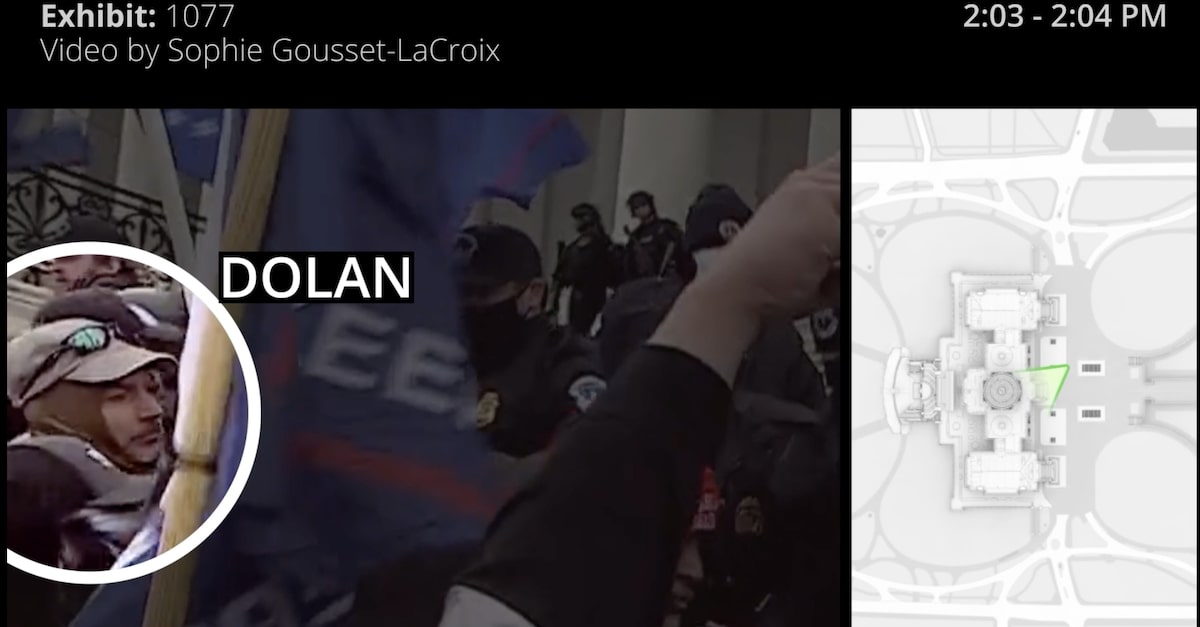
Oath Keepers member Jason Dolan is seen in a screenshot of an illustrated video of him at the U.S. Capitol on Jan. 6. (Image via DOJ)
The day after an ex-Oath Keepers recruit described why he decided to take up arms to reverse former President Donald Trump’s electoral defeat, attorneys for the group’s leader and other members took turns trying to undermine his credibility.
On Tuesday, ex-Oath Keepers member Jason Dolan described how he joined the group after the 2020 presidential election. A 20-year veteran with the Marine Corps, Dolan gave detailed descriptions of the group’s internal communications, their transportation of weapons just outside the city limits of the nation’s capital, and the willingness of Oath Keepers members to sacrifice greatly to halt the congressional certification of President Joe Biden’s victory.
“[I]f I’m lucky I get a prison sentence, tagged with treason, or a bullet from the very people I would protect,” Dolan wrote in a Signal chat message to other Florida chapter members of the Oath Keepers. “Yet I swore to defend this country against all enemies foreign & domestic.”
During his direct examination, Dolan also disclosed his struggles with alcohol, his joining the group to find a sense of belonging, and the fact that his cooperation agreement could greatly reduce sentencing exposure that could otherwise lead to decades of imprisonment.
On Wednesday, defense attorneys for five of the Oath Keepers leaders and members he’s testifying against walked a delicate line. Each took turns praising the Marine veteran’s service, before focusing in on the disclosures that would undermine how a jury considers his testimony.
Oath Keepers leader Stewart Rhodes’s attorney Phillip Linder started his cross-examination with the events immediately following the Jan. 6th attack on the Capitol. Dolan said that the on the next day’s drive back home to Florida, the mood was “subdued,” and he remembered little of the conversation. The ex-Marine said that maintained some communications with fellow Oath Keepers back in the Sunshine State.
Following his arrest, Dolan said, he had few clear memories of what law enforcement told him. He also claimed not to remember his maximum sentencing exposure on his charges of conviction: 20 years for obstructing an official proceeding and five years for conspiracy. The recommended sentencing guidelines range under his plea deal is roughly between five and seven years.
Asked if he believed cooperation could lower his eventual sentence, Dolan acknowledged: “There is a chance.”
Dolan also spoke about his initial impressions of the Oath Keepers favorably, recalling his first event with the group.
“It was an event for Roger Stone, who was coming to speak,” Dolan testified, referring to the close Trump associate.
Roger Stone is seen arriving at the Conservative Political Action Conference on February 27, 2021 in Orlando, Florida. (Joe Raedle/Getty Images)
The Jan. 6th Committee uncovered in a public hearing that both the Oath Keepers and the Proud Boys had encrypted chat forums titled “Friends of Stone,” named after the longtime GOP operative with a reputation as a “dirty trickster.” Trump, during his lame duck session, pardoned Stone just before Christmas Eve. Stone hinted shortly before that announcement that he was under “enormous pressure to turn on” Trump.
Defense attorneys also focused on Dolan’s understanding of the legal dimensions of what they were doing. Prosecutors had guided Dolan through questions about his transportation of weapons into a Comfort Inn in the Ballston neighborhood of Arlington, Va., just outside the city limits of Washington, D.C. Linder noted that the possession of those weapons was legal in that jurisdiction.
“Was it your understanding that people were trying to follow the law?” Linder asked.
“Yes,” Dolan replied.
“Were you trying to follow the law?” the attorney prodded.
“Yes,” he affirmed.
Prosecutors claim that the conduct of the Oath Keepers crossed into seditious conspiracy when they allegedly planned to deploy a so-called “quick reaction force,” or QRF, from that hotel with Washington, D.C. The Oath Keepers defendants argue that they would have had the right to tote those weapons if Trump invoked the Insurrection Act, which they claim would have militarized far-right groups like them.
“Did Trump invoke the Insurrection Act?” Linder asked.
“No,” Dolan replied.
Prosecutors claim that the Insurrection Act was simply a legal cover for the Oath Keepers to pursue their ambition to block Biden’s certification. The QRF ultimately never deployed, but under the statute, an alleged seditious conspiracy does not need to be completed or successful.
After questioning from Rhodes’s counsel, Dolan faced cross-examination by an attorney for Oath Keepers Florida chapter leader Kelly Meggs. That lawyer, Juli Haller, is one of the attorneys behind the so-called “Kraken” litigation, which tried to reverse Trump’s defeat in Michigan with discredited conspiracy theories. Her questioning is ongoing.
This is a developing story.